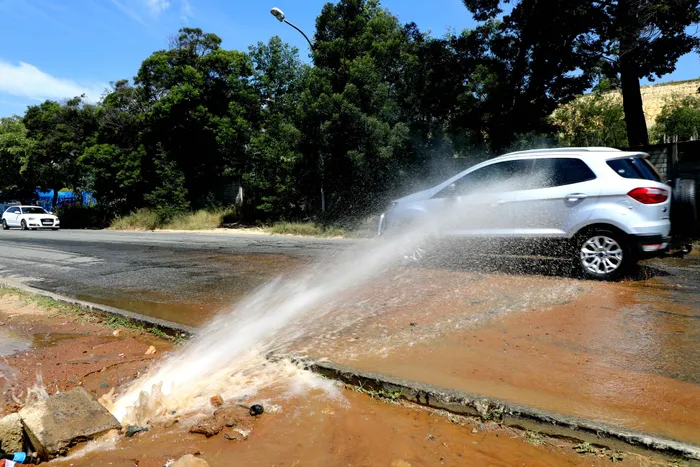AI solutions may enhance SA’s water security

Picture: Timothy Bernard/African News Agency (ANA)/March 22, 2023 – Robersham residents, protesting at the Southdale depo of Joburg Water after up to 12 days without water, say authorities are not resolving their complaints and problems – such as this damaged water pipe leaking gallons of water. Artificial Intelligence, characterised by the ability to interpret external data, learn from experience, and achieve specific goals through adaptive processes, can revolutionise water management, the writer says.
By Anthony Kaziboni
Water scarcity is a pressing concern in South Africa, ranked the 39th driest globally and experiencing low precipitation levels in the Southern African region. Despite having adequate water resources, household water security (HWS) remains a significant challenge because of several anthropogenic factors.
Recent cholera outbreaks, disheartening findings in the 2023 Blue Drop Watch Report, and a notorious 58-hour water outage by Rand Water have highlighted the pressing need to improve household access to clean water. Addressing these challenges requires innovative solutions, and integrating Artificial Intelligence (AI) in water management systems shows promise in transforming South Africa’s water security landscape.
Cholera Outbreaks and Inequality
Cholera outbreaks have been a recurring nightmare in South Africa, disproportionately affecting marginalised communities with limited access to clean water and sanitation. These outbreaks reveal the deep-seated socioeconomic inequalities within the country, with overcrowded informal settlements, inadequate sanitation facilities, and insufficient healthcare services disproportionately affecting black populations at higher risk.
The cholera outbreak in Hammanskraal, a small rural town in northern Gauteng, proved fatal, claiming the lives of over 30 individuals, while several provinces also witnessed positive cases. Notably, Gauteng and Free State bore the brunt of the impact. The country saw a surge in patients seeking medical attention for suspected cholera symptoms, with the highest numbers recorded in Gauteng, accounting for at least 92 percent (152 cases) of the total, followed by Free State with 5 percent (nine cases). Other provinces, such as Limpopo and Mpumalanga (one case each) and North West (three cases), also reported positive cholera cases.
Declining Water Quality
The Department of Water and Sanitation’s bleak 2023 Blue Drop Watch Report revealed alarming statistics regarding drinking water quality in South Africa. Over half of the tested water systems failed to comply with chemical water quality standards. Only 17 percent of water systems achieved an “excellent status”. A meagre 13 percent of the systems achieved good status, and 15 percent were poor. The Report underscores the importance of addressing water management and infrastructure issues to ensure the population has safe and clean drinking water.
Rand Water’s Declining Infrastructure
Rand Water, renowned as the largest bulk water utility in Africa and one of the world’s largest, is crucial in supplying bulk potable water to over 11 million people residing in Gauteng, parts of Mpumalanga, the Free State, and North West. To address vital and long-overdue maintenance requirements for the water infrastructure in Gauteng, Rand Water strategically executed a planned 58-hour water outage. This outage aimed to ensure the region’s water supply’s reliability and efficiency.
The maintenance-related water outage further exposed vulnerabilities in the country’s water infrastructure. All direct feeds from Rand Water were affected during the shutdown, impacting tens of thousands of households in the Roodepoort, Central and Soweto areas. Furthermore, Rand Water said some residents within the local municipalities of Rustenburg, Mogale City and Rand West would be affected. Albeit the positive outcome of the repairs, the outage raised concerns about HWS, particularly the integrity of water infrastructure in the country.
Transformative Potential of AI in Water Management
To achieve a sustainable and secure water future and ensure household water security, South Africa must adopt proactive and innovative measures, and AI offers transformative potential in this endeavour. Artificial Intelligence, characterised by the ability to interpret external data, learn from experience, and achieve specific goals through adaptive processes, can revolutionise water management.
AI techniques hold immense value in detecting and managing leaks in water distribution networks. South Africa’s outdated water infrastructure currently experiences significant non-revenue water losses of about 40 percent due to leaks and non-payment. AI technology can predict leakages, estimate pipe corrosion, and optimise capital, revenue, operating costs, and services. By prioritising maintenance and infrastructure replacement, city and town officials can ensure better water quality and prolong the efficacy of critical water and wastewater expenditures. By doing this, AI can contribute to water conservation and improve network efficiency by minimising leaks and reducing non-revenue water.
Considering the challenges of water scarcity in South Africa, integrating AI into water management can significantly improve water resource allocation, reduce losses, and enhance overall efficiency. AI-driven solutions can optimise water usage, promoting more sustainable and equitable water distribution.
What about Ethics and Good Governance?
The successful integration of AI in water management necessitates ethical and responsible leadership. Transparency, accountability, and sound governance practices are vital to ensure that AI-driven solutions benefit all citizens equitably. Additionally, South Africa must remain vigilant against corruption, poor governance, and maladministration, which could hinder the effective implementation of AI solutions and exacerbate water insecurity. Furthermore, collaboration between government, businesses, and stakeholders is essential in combatting corruption and fostering a culture of integrity to maximise the positive impact of AI technologies on water security.
Addressing household water security challenges in South Africa requires proactive and innovative solutions. Integrating AI-driven solutions in water management offers promising opportunities to optimise water resources, detect leaks, and enhance efficiency. By adopting AI technologies with ethical leadership and transparent governance practices, South Africa can pave the way for a sustainable and secure water future for all its citizens.
Dr Anthony Kaziboni is head of Research at the Institute for the Future of Knowledge, University of Johannesburg
Related Topics: